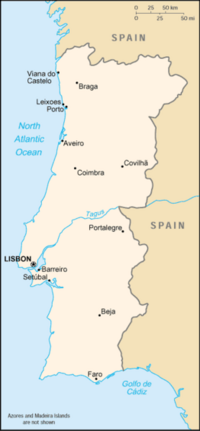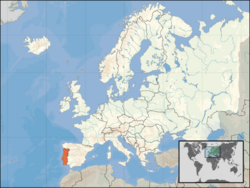Portugal
| Portuguese Republic República Portuguesa |
||||||
|---|---|---|---|---|---|---|
| Map of Portugal
|
||||||
| Location of Portugal on the European continent
|
||||||
|
||||||
| Anthem: "A Portuguesa" "The Portuguese Anthem" |
||||||
| Patron Saint(s): Saint George | ||||||
| Capital (and largest city) | Lisbon | |||||
| Official language(s) | Portuguese | |||||
| Recognised regional languages | Mirandese[a] | |||||
| Ethnic groups (2007) | 96.87% Portuguese 3.13% others |
|||||
| Demonym | Portuguese | |||||
| Government | Unitary parliamentary constitutional republic |
|||||
| - | President | Aníbal Cavaco Silva | ||||
| - | Prime Minister | Pedro Passos Coelho | ||||
| - | Assembly President | Assunção Esteves | ||||
| Legislature | Assembly of the Republic | |||||
| Formation | Conventional date for independence is 1139 | |||||
| - | Founding | 868 | ||||
| - | Re-founding | 1095 | ||||
| - | De facto sovereignty | 24 June 1128 | ||||
| - | Kingdom | 25 July 1139 | ||||
| - | Recognized | 5 October 1143 | ||||
| - | Papal Recognition | 23 May 1179 | ||||
| - | Republic | 5 October 1910 | ||||
| - | Democracy | 25 April 1974 | ||||
| Area | ||||||
| - | Total | 92,212 km2 (111th) 35,603 sq mi |
||||
| - | Water (%) | 0.5 | ||||
| Population | ||||||
| - | 2012 estimate | 10,581,949 (77th) | ||||
| - | 2011 census | 10,561,614 | ||||
| - | Density | 115/km2 (96th) 298/sq mi |
||||
| GDP (PPP) | 2011 estimate | |||||
| - | Total | $248.981 billion (49) | ||||
| - | Per capita | $23,361 (41) | ||||
| GDP (nominal) | 2011 estimate | |||||
| - | Total | $238.880 billion (42) | ||||
| - | Per capita | $22,413 (35) | ||||
| Gini (2009) | 33.7 | |||||
| HDI (2011) | ||||||
| Currency | Euro (€)[b] (EUR) |
|||||
| Time zone | WET (UTC+0) | |||||
| - | Summer (DST) | WEST (UTC+1) | ||||
| Note that the Azores are in a different timezone (UTC-1 in summer). | ||||||
| Date formats | dd-mm-yyyy, yyyy-mm-dd | |||||
| Drives on the | right | |||||
| Internet TLD | .pt | |||||
| Calling code | 351 | |||||
| a. ^ Mirandese, spoken in some villages of the municipality of Miranda do Douro, was officially recognized in 1999 (Lei n.° 7/99 de 29 de Janeiro), since then awarding an official right-of-use Mirandese to the linguistic minority it is concerned. Portuguese Sign Language is also recognized. b. ^ Prior to 1999, the national currency was the Portuguese escudo ($). |
||||||
- For the Portuguese CreationWiki: Click here
Portugal, officially the Portuguese Republic (Portuguese: República Portuguesa), is a country in the extreme southwest of Europe, located on the Iberian Peninsula. It borders Spain to the north and east; the North Atlantic Ocean to the west and south, and also includes two archipelagos in the Atlantic: the Azores and Madeira. Its capital city is Lisbon.
History
Portugal has been continuously settled since ancient times. It was settled by Celts like the Gallaeci and the Lusitanians who later were integrated into the Roman Republic and assimilated with the Roman conquerors. Germanic peoples such as the Suebi, Alans, Buri, Vandals and the Visigoths later settled the region. In the 8th century most of the Iberian Peninsula was conquered by Moorish invaders professing Islam, who were later expelled by the Knights Templar under the Order of Christ. During the Christian Reconquista, Portugal established itself as an independent kingdom from León in 1139, claiming to be the oldest European nation state.[1]
References
- ↑ Brian Jenkins, Spyros A. Sofos, "Nation and identity in contemporary Europe", p. 145, Routledge, 1996, ISBN 0-415-12313-5
| ||||||||||||||||||||




